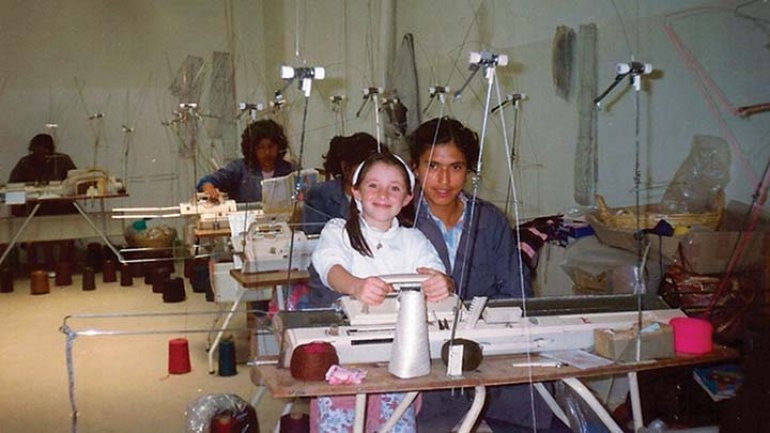Dakota Tracht
Dakota Tracht
Dakota Tracht makes garments about identity and place – which, for her, are essentially the same thing. Modern and artful, her knitted wearables are her homage to the landscape and culture of Bolivia, where she was born and raised.
“So much of who I am comes from that,” says Tracht, 31, who now lives in Santa Barbara, California. With their stylized nods to traditional motifs, palette of earth tones accented with bright color, and images of peaks, her designs reflect a land of strong sunlight, cold air, and the all-encompassing majesty of the Andes.
“I call La Paz the city in a bowl, because it’s in the center of the mountains,” she says. “The mountains were always this presence in my life, surrounding me.”
Textiles, too, loomed large throughout Tracht’s childhood. “I was so lucky. There was a constant influx of beautiful fabrics coming through my house, she recalls. Her American parents, Laurie Adelson and Arthur Tracht, met in 1976 in La Paz, where both were researching indigenous textiles. Settling there, they became respected scholars of pre- Columbian textiles from Bolivia and Peru, and in 1983 co-authored the classic book Aymara Weavings: Ceremonial Textiles of Colonial and Nineteenth Century Bolivia, which spawned a Smithsonian traveling exhibition. That same year they founded Millma, a company employing local women in the creation of contemporary knit fashions in native alpaca, inspired by traditional Andean designs. (The line has since expanded to include other traditional textiles and design influences.)
In their factory, young Dakota was immersed in textile production, surrounded by workers who were like family to her. Being there instilled in her an appreciation for the hand touch in original, quality clothing (in sharp contrast to “fast fashion,” mass-produced quickly to capitalize on trends), as well as the social and economic good that craft can do.
“So many women who came through the operation have told my mother that they gained so much confidence in themselves from learning how to put their hands to work at a high level of production,” she says proudly.
Tracht brought that sense of mission with her to the University of Wisconsin-Madison, where she majored in journalism and wrote for a local Hispanic newspaper that served a largely poor, immigrant readership. After graduation she worked in sales at Univision, the Spanish-language TV network, but soon felt the pull of home and handcraft. Returning to La Paz, she created a line of simple yet sophisticated knit tops and skirts for Millma, an experience that motivated her to study fashion and textile design in earnest.
Tracht enrolled at Rhode Island School of Design, where she made a series of experimental sculptural garments that combined traditional alpaca fibers and hand techniques (knitting, dyeing, sewing, draping, forming, appliqué) with synthetic materials and fabrics produced on RISD’s computer-controlled industrial knitting machine. Those elements might sound incompatible, but Tracht explains their marriage in terms of magical realism, a Latin American literary genre where the supernatural is accepted in an otherwise rational world. “I wanted to make things that left you with a sense of bewilderment as to how they were made.”
Her portfolio caught the attention of Forms+Surfaces, a company that designs and manufactures innovative, eco-friendly architectural products. Hired last year for its West Coast design office, Tracht is enjoying the challenge of working in a variety of materials, from etched glass to woven steel, while pursuing her own art in her free time. She’s especially happy to be with a firm that, like that of her parents, takes a socially conscious approach to manufacturing. It’s an ethos she dreams of one day emulating, perhaps with a company of her own.
“As consumers, we’re sometimes so separated from process,” she observes. “For me, it’s about having a relationship to manufacturing – giving people skills and letting them shine.”
The Personal Touch
Call and response: “I react to materials so strongly. I wait to see what happens when I knit, then I respond and get my hands back into the fabric.”
Favorite fashion icon: “I love Vivienne Westwood. She believes in community and is a champion for so many incredible causes.”
Haute couture moment: A month working on Marchesa gowns for the spring/ summer 2014 season. “I was dip-dyeing goose feathers and sewing them on lace. It was so fun.”
Rage against the machine? “I have a complicated relationship with technology,” admits Tracht; she likes what it makes possible but not that it displaces skilled artisans.
Joyce Lovelace is American Craft’s contributing editor.

